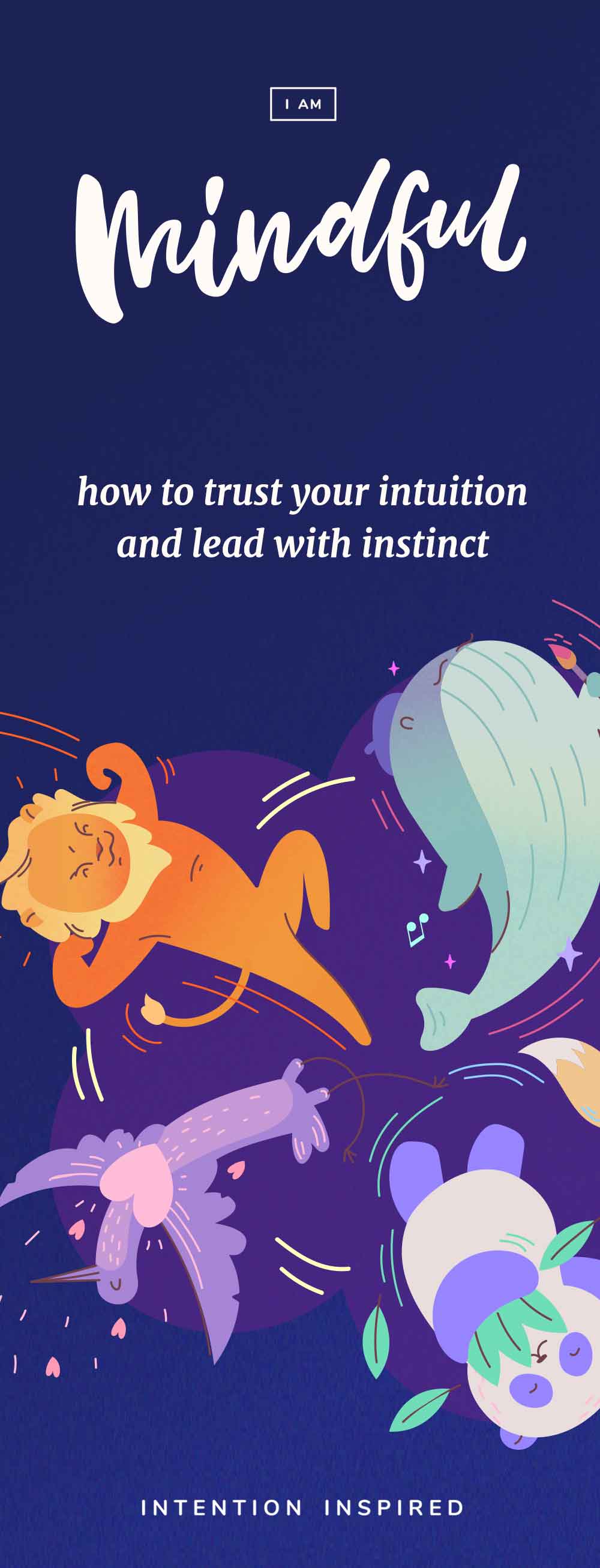Recently, my husband and I watched the movie Innsaei: The Power of Intuition. It sparked my interest. I’ve always felt like instinct was something that graced my life on occasion. More often than not, I had questions, and instinct didn’t seem to want to jump in and answer them. I tried to be patient, but secretly found it infuriating. How did other people call upon their instinct to help them when they needed it?
I began reading articles online. After finding a few tips on how instinct can be practiced and encouraged, I shared them with my husband. He asks as many questions as I do. I thought some of these practices might help him find more clarity around a few questions that pestered him daily.
“Oh, I already know what my instinct says,” he said.
“You do?” I responded, surprised, given how much he vacillated.
“Yeah, I’ve just been waiting for it to change to a different answer.”
I laughed, knowing the feeling all too well. In fact, I think instinct often visits me, and I either ignore it or try and talk myself into a different solution. Does this sound familiar? Sometimes the answers are so clear, but they aren’t the ones we want to hear.
We have broken relationships with instinct. Often, we choose desire over instinct. We want to want what we want, and if instinct gets in the way, we treat it as an unwelcome guest. Then, when we really do need instinct’s help, how can we expect to tune into what it has to say if we’ve only practiced tuning it out?
Being guided by instinct doesn’t always come naturally. It’s something we need to practice, and with time, we’ll become more familiar with it, or more instinctual, if you will. Can you think of a time when instinct led you astray? When you wished you hadn’t followed that small voice that somehow knew? Few of us can recall of an experience when we regretted following our instinct.
Instinct usually wins in the end, and the more we delay aligning with it, the higher the stakes are; the more involved we are in a relationship, or the more financially vulnerable we become, or the more entangled our emotions are. By learning how to let instinct lead, we will tap into the wisdom of our own life experiences, and the more we can trust this mysterious experience.
Defining Instinct
Instinct isn’t something we can touch, feel, taste, or see. It’s a felt sense. It’s a knowing without knowing how we know it. Merriam-Webster defines instinct as, “A largely inheritable and unalterable tendency of an organism to make a complex and specific response to environmental stimuli without involving reason.” (1)
Instinct happens below our level of consciousness. It’s the force behind first impressions. Have you ever met someone your friend adores, and yet you feel a slight clench in your stomach when shaking their hand, like something isn’t quite right? This is likely instinct, and it’s picking up cues below our level of awareness.
Part of this response is inherited, and the rest is based on our subconscious mind’s accumulated experiences for as long as we’ve been alive. (2) Just because we don’t perceive something doesn’t mean it’s not a part of who we are, creating the fabric of how we interact in the world. In fact, we’re aware of a very small percentage of the stimulus we encounter in daily life. It's thought that the subconscious mind is far more aware than the conscious mind, some say up to 95%. (3,4)
Even though it sounds illusive, instinct is something we all possess, and there are certain things we can do to become more intimate with our gut feelings.
Give it Time and Space
When faced with a big decision, some of us jump right to the pro/con lists, taking polls from others, or even flipping coins. We don’t want to sit in the discomfort of making a decision, and sometimes we decide in the direction of what would be easiest, not what our instinct says.
Give your instinct some space and some time. If someone is waiting on you to make a decision, or you’re having a heated conversation while trying to find a resolution, let the other person know you need a night to sleep on it. Make space for some idle time, either going on a walk or talking a shower, and see what comes to you.
With time and space, situations look different, especially if there’s an emotional trigger involved. Create physical distance between you and the stimulus – drive to a park and go on a hike – and see what comes. Instinct can’t be rushed, and because we aren’t used to listening to it, we need to create the right conditions for it to speak up.
Become Familiar with the Felt Sense
Instinct doesn’t communicate through words. It communicates through physical sensations, through your senses, and through your feelings. Get to know what your instinct feels like . Sit down somewhere comfortable, without distractions. Think of a decision you’ve made in the past, or one you need to make in the present. Let’s use this example: you’re wondering if you’re ready to have children.
In your mind, think to yourself, “I’m ready to have children” (or one side of whatever decision you're trying to make). Remaining still with your eyes closed, notice what you feel in your body when you think this thought. Is there warmth? An opening and softening? A tightness in the pit of your belly? A shiver or sudden coldness?
Next, think of the opposite side: “I’m not ready to have children.” What are the sensations following that thought? Compare the two experiences. Become familiar with how intuition speaks to you through your body. The more intimate you become with this experience, the more likely you are to notice when instinct comes knocking. (5)
Know Instinct’s Imposters
There are a few emotions parading around as instinct. My husband was waiting for instinct to make a different choice, but it wouldn’t have been instinct that spoke up and contradicted his first felt sense; it would have been one of instinct’s imposters, and it would have led him in the wrong direction.
Reason is one imposter. Reason can be a very good thing, don’t get me wrong, but we’ve all experienced indecisive reason; collecting bits of data to support why we should stay in this relationship, or only paying attention to the signs confirming our decision to go to grad school, even when it doesn’t feel right. If the pro and con lists are starting to get in the way and there’s no decision after the lists have been exhausted, reason might need to bow aside and let instinct take over.
Expectations are another imposter. They are easily identified because they’re attached to the word “should.” “I should have kids because it’s what all my friends are doing,” or “I should take this job because it pays well.” Anytime “should” appears in our vocabulary, we need to take a step back. “Shoulding” ourselves comes from many places, and none of them are instinct. We carry ideas about what we “should” do, and how we “should” be, based on our families, society, friends, etc. Expectations prohibit instinct. Cast the “should” aside, and instead turn towards your own voice, the only one that will know the right decision for you.
Persistent questions that don’t actually need answering are instinct’s third imposter. Like I mentioned earlier, I ask a lot of questions, and I become frustrated when there isn’t an answer. Recently, a trusted friend listened to my storming questions and asked, “Do you even need to answer those questions right now?”
I was stunned into silence. I hadn’t even paused to wonder if these questions needed answering, right here, right now, like I was demanding. After pausing, I realized these were questions mainly about the future, and they didn’t need answers, I only wanted the answers to make me feel more comfortable and assured. I’d gone and wasted so much energy seeking something I didn’t need to be content in the present moment. All I needed to do was let go of needing to know.
Just because we have a question doesn’t mean instinct will answer it for us right now. In fact, after I asked my instinct if I needed to answer those questions, it told me no. Instead of asking the same questions over and over, start by asking your instinct if this is even something you need to decide right now. Chances are, if you instinct says no, there’s more you need to experience before you’ll be able to know the answer, anyway.
Let Instinct Lead
The longer we put off listening to our instinct, the more severe the consequences become. There are many reasons why we might not listen to our instinct right away. We might not like the answer, it might make us fearful, or we might feel discomfort or embarrassment by the action we need to take.
I lead yoga workshops on grief. At the end, we all sit in a circle and each person has the chance to share their experiences with the group. It’s very common for questions to be asked during the circle; the unanswerable kind, like, “What do I do?” or “How do I make the pain go away?”
I want to answer their questions. I want to give them something to hold onto and erase their discomfort, which would also erase my discomfort seeing them in pain. My instinct always tells me to stay quiet, to let them talk and not give any answers.
This has become a powerful practice, and I’ve come to see the wisdom of my instinct. The questions participants ask are either ones I cannot answer for them, ones their instinct will know with time, and even ones they’ve already answered, but they don’t like the answer, so they’re fishing for something else. By staying quiet, I allow their journey to unfold just as it should. If I were to answer, the words wouldn’t actually make much of a difference. Besides, who am I to say what they need in that moment beyond loving presence?
It’s uncomfortable to end a relationship, or to part ways with a business partner, or to settle a dispute with a friend. We need to learn to trust our instinct and do what it says, because otherwise, those situations will continue to eat at us, or actively get worse. The embarrassment, the discomfort, even the disadvantages that might come with acting on our instinct are temporary. They will pass, and life will move beyond that experience. If we ignore what we must do, the situation will fester, making it harder to act appropriately.
Your instinct is there for you, steadfast and dedicated to your well-being. You can trust it. You can work to create a relationship where it speaks to you, frequently and honestly. We only need to be brave enough to receive what it has to say. I’ve never heard someone say, “If only I hadn’t followed my instinct!” And the great news is instinct will never say, “I told you so” if you stray from its advice. It will welcome you back, eager for your ears and support. As you make decisions, both right and wrong, instinct will continue to be there, always offering a thought or two.
(Read this next: 4 Characteristics of the Everyday Hero)

